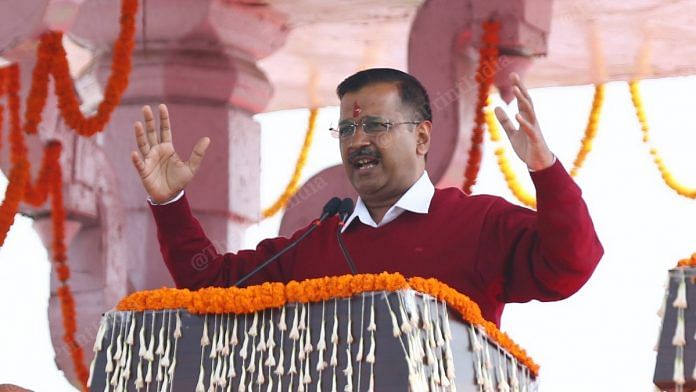New Delhi: As Delhi Chief Minister Arvind Kejriwal took oath for the third consecutive time at Ramlila Maidan, his speech at the end of the ceremony was full of symbolism, apart from poems, slogans and songs.
ThePrint looks at some of the crucial takeaways from the speech Sunday to understand the “evolved Kejriwal” from the time he first assumed power in 2013.
AAP’s national ambitions loud and clear
While much of Kejriwal’s speech was on his “Delhi family” that ensured stunning victory in the elections, he did use the occasion to make it clear that he still harboured national dreams.
“You all have given birth to a new kind of politics — kaam ki rajneeti, school ki rajneeti, sasti bijli ki rajneeti, paani ki rajneeti, aurat ki suraksha ki rajneeti (the politics of work, the politics of schools, the politics of cheap electricity, the politics of women’s safety),” the chief minister said, adding that this was the “politics of 21st century India”.
He further said that other state governments were borrowing the AAP-led government’s schemes, be it the education model or the city’s mohalla clinics. “The people of Delhi have created history. Our model is being replicated across the country,” he said.
Also read: Yogi wanted to divide Delhi voters on biryani, but Kejriwal’s aloo paratha kept them united
Approach towards Modi, central govt
The chief minister had sought co-operation from the Modi government in both his 2015 and 2020 speeches but there was a difference this time around. In 2015, Kejriwal took a jibe at Prime Minister Narendra Modi, asking him to run the rest of the country while leaving “dilliwallahs” to the Aam Aadmi Party (AAP).
This time, the speech was all placatory. “I had invited Prime Minister Narendra Modi for the ceremony. Through this platform, I wish to seek his blessings for Delhi,” he said.
In that respect, the speech was an extension of Kejriwal’s positive approach towards the Centre ever since AAP’s defeat in the 2019 Lok Sabha elections.
No AAP caps for CM, ministers
Another stark contrast was the absence of the symbolic AAP topis (caps) from Kejriwal and his six-member cabinet that took oath with him Sunday. In 2015, each of them had donned the caps and had kept them on right until the end of the ceremony.
Song selection
While Arvind Kejriwal chose to sing Insaan Se Insaan Ka Ho Bhaichara (There should be brotherhood) in 2015, he continued with the tradition to end his speech at the oath-taking ceremony, only with another song this time. Singing Hum Honge Kamyaab (We shall overcome) this time, Kejriwal subtly conveyed his “never give up” approach towards his political ambitions.
Pet themes
Sunday’s event was also an extension of the AAP election campaign, which focused on government’s schemes and issues such as education, health, electricity, water and women security.
There was none of the AAP’s pet themes of 2015 — the demand for statehood for Delhi and the Jan Lokpal Bill to tackle corruption.
Body language
The chief minister’s body language also exuded confidence this time, be it in his dialogue or body language. Unlike 2015, when Deputy Chief Minister Manish Sisodia stood right beside him, the Kejriwal of 2020 stood by himself.
It was the content, however, that was more balanced — apart from seeking the blessings of the PM, the chief minister also made it clear that his policy decisions will not be affected by political ideologies and preferences.
He also referred to the BJP’s vitriolic election campaign, which included West Delhi MP Parvesh Verma calling him a terrorist, saying he had forgiven his political opponents for those remarks.
Also read: The transformation of Arvind Kejriwal from an ‘anarchist’ to a smart, successful politician



